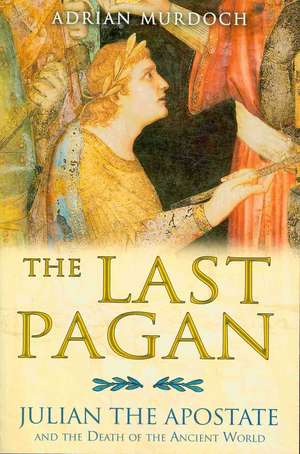The Last Pagan: Julian the Apostate and the Death of the Ancient World
Autor Adrian Murdochen Limba Engleză Paperback – 31 mar 2008
• Portrays the “Apostate” as a poet-philosopher, arguing that had he survived, Christianity would have been checked in its rise
• Details reforms enacted by Julian during his two-year reign that marginalized Christians, effectively limiting their role in the social and political life of the Empire
• Shows how after Julian’s death the Church used paganism to represent evil and opposition to God, a tactic whose traces still linger
The violent death of the emperor Julian (Flavius Claudius Julianus, AD 332-363) on a Persian battlefield has become synonymous with the death of paganism. Vilified throughout history as the “Apostate,” the young philosopher-warrior was the last and arguably the most potent threat to Christianity.
The Last Pagan examines Julian’s journey from an aristocratic Christian childhood to his initiation into pagan cults and his mission to establish paganism as the dominant faith of the Roman world. Julian’s death, only two years into his reign, initiated a culture-wide suppression by the Church of all things it chose to identify as pagan. Only in recent decades, with the weakening of the Church’s influence and the resurgence of paganism, have the effects of that suppression begun to wane. Drawing upon more than 700 pages of Julian’s original writings, Adrian Murdoch shows that had Julian lived longer our history and our present-day culture would likely be very different.
Preț: 112.15 lei
Nou
Puncte Express: 168
Preț estimativ în valută:
21.46€ • 22.28$ • 17.90£
21.46€ • 22.28$ • 17.90£
Carte indisponibilă temporar
Doresc să fiu notificat când acest titlu va fi disponibil:
Se trimite...
Preluare comenzi: 021 569.72.76
Specificații
ISBN-13: 9781594772269
ISBN-10: 1594772266
Pagini: 260
Dimensiuni: 154 x 230 x 17 mm
Greutate: 0.38 kg
Ediția:Us.
Editura: INNER TRADITIONS INTERNATIONAL
ISBN-10: 1594772266
Pagini: 260
Dimensiuni: 154 x 230 x 17 mm
Greutate: 0.38 kg
Ediția:Us.
Editura: INNER TRADITIONS INTERNATIONAL
Notă biografică
Adrian Murdoch is a historian and journalist. He is the author of "Rome's Greatest Defeat: Massacre in the Teutoburg Forest" and "The Last Roman," a biography of Romulus Augustulus, the Western Roman Empire's final emperor. He is a fellow of the Royal Historical Society.
Recenzii
"British historian Adrian Murdoch's "The Last Pagan "(the phrase comes from the English poet Swinburne)" "is a thorough-going biography of Julian. In this book, we get a strong sense of the history of the fourth century, which is the age of the decline of the Roman empire made famous by English historian Edward Gibbon, who Murdoch asserts, made Julian the hero of his work."--Barbara Ardinger, reviewer, Aug 2009
"Murdoch, a Roman historian, sees the short reign of Julian as the real end of ancient Rome. His biography of the young emperor is based on Julian's own words, the angry response of Christian writers, and the comments of other pagans."--Book News, Inc., Aug 2008
"Murdoch, a Roman historian, sees the short reign of Julian as the real end of ancient Rome. His biography of the young emperor is based on Julian's own words, the angry response of Christian writers, and the comments of other pagans."--Book News, Inc., Aug 2008
Textul de pe ultima copertă
History / Biography"A thoroughly engaging book about one of the fourth century's most interesting emperors."--The Journal of Classics Teaching"Keenly paced and beautifully written . . . quite simply one of the best historical biographies of the year."--Catholic Herald"Friendly to its controversial subject and an easy read."--Church TimesThe violent death of the emperor Julian (Flavius Claudius Julianus, AD 332-363) on a Persian battlefield has become synonymous with the death of paganism. Vilified throughout history as the "Apostate," the young philosopher-warrior was the last and arguably the most potent threat to Christianity.The Last Pagan examines Julian's journey from an aristocratic Christian childhood to his initiation into pagan cults and his mission to establish paganism as the dominant faith of the Roman world. Julian's death, only two years into his reign, initiated a culture-wide suppression by the Church of all things it chose to identify as pagan. Only in recent decades, with the weakening of the Church's influence and the resurgence of paganism, have the effects of that suppression begun to wane. Drawing upon more than 700 pages of Julian's original writings, Adrian Murdoch shows that had Julian lived longer our history and our present-day culture would likely be very different.ADRIAN MURDOCH is a historian and journalist. He is the author of Rome's Greatest Defeat: Massacre in the Teutoburg Forest and The Last Roman, a biography of Romulus Augustulus, the Western Roman Empire's final emperor. He is a fellow of the Royal Historical Society.
Cuprins
List of Plates and Maps
Acknowledgments
A Note on Names
Introduction: The Brittle Glass
1 Return of the Gods
2 A Written Order
3 Heart of Fire
4 Out of the Darkness
5 The Shadow of Sacred Plumes
6 Sung in Vain
7 Nothing in Excess, Augustus
8 Where King Nebuchadnezzar Grazed
9 Present Opportunity
10 Toward the Islands of the Blest
Epilogue: By the Silvery Kydnos
Notes
Selected Bibliography
Index
Acknowledgments
A Note on Names
Introduction: The Brittle Glass
1 Return of the Gods
2 A Written Order
3 Heart of Fire
4 Out of the Darkness
5 The Shadow of Sacred Plumes
6 Sung in Vain
7 Nothing in Excess, Augustus
8 Where King Nebuchadnezzar Grazed
9 Present Opportunity
10 Toward the Islands of the Blest
Epilogue: By the Silvery Kydnos
Notes
Selected Bibliography
Index
Descriere
This book reveals Julian, the "Apostate," and his failed attempt to stem the Christian tide sweeping the Roman Empire. His death on a Persian battlefield came to represent the death of paganism and the church subsequently claimed paganism represented evil and opposition to God.
